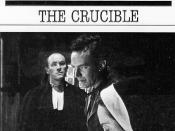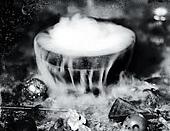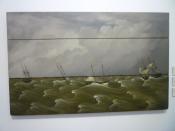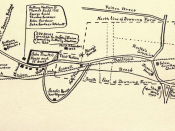"The Front"ÃÂand The Crucible The statement that will be compared in this essay will be, number one, that Heckie Brown is an innocent victim. A companion statement from The Crucible is that like Heckie, John Proctor is also an innocent victim. While two men lived in very different time periods, they are very similar, as unjust acts occurred in 1692 Salem and 1952 America. In this comparison essay, I will explain why these unjustly acts were committed as well as the differences and similarities in the two stories.
John Proctor was a good man who made a mistake. His wife had taken ill for quite some time, he became a little anxious and made a mistake with his servant, Abigail, who had been in love with him. After his wife caught them, Abigail was fired and her reputation grew worse. She then got involved with Tituba and the whole witchcraft thing, and when Proctor came to see them, she confessed her love for him that had been getting stronger.
He wisely told her that it was over and that it wasn't going to happen again. When Abigail found out that if she accused people of witchcraft , they presumably would be found guilty or forced to sign an untrue confession, she jumped at the opportunity to have Mrs.
Proctor killed or out of the way. Like the good and loving husband John was, he stood up and told the truth about how his wife was not a witch. While fighting for his wife, he got himself caught in the witchcraft ordeal and was forced to choose between his name, which includes his wife, kids, and dignity or an unjust death. He was prepared to sign the false confession, but he knew he just couldn't do it. John gave up his life for a true belief and eventually put an end to the witchcraft problem.
Heckie Brown was a successful and well know actor. He was very likable and comical in person as well as on television. Much like in The Crucible, there was a pursuit to find communists or communist sympathizers. Instead of being sent to court right away from any random accusation, those who were to have been thought of as being a communist were tracked by writings, friends, etc.and if those accused were still thought of were black listed. A black list was a list of actors, writers, directors ,authors ,etc who were thought of as being communists or communist sympathizers who would not be able to work. Instead of being in court in front of people as a public affair, those responsible of this black list denied it's existence. Heckie Brown, as stated earlier, was very well liked.
He unfortunately made a mistake similar to John Proctor. Heckie was also a bit anxious and he had a relation with a woman who he didn't know was a communist. People found out and became suspicious of Heckie, he agreed to cooperate and name names or do whatever they asked of him as long as he could get work. After being dropped and rejected from numerous places, he got a job that paid nothing near a man of his popularity would make, he was promised 300$ and after the job was done the man only gave him 250$. Heckie went downhill from here and never worked again, because it wasn't possible. One night, Heckie Brown jumped out of a hotel window and committed suicide.
Heckie, like John didn't want to have to live a lie, something he didn't believe in. So he did something he believed to be right and took his life. Eventually the black list was gone.
These two stories were very similar. The worlds of 1692 and 1952 seem very close. Both ages had unjust persecutors, random accusations, a hero, and a problem. The main and most significant difference was, in "The Front"ÃÂ, Hackie Brown committed suicide and in The Crucible, John Proctor was put to death by unjust judges. He was fighting for what was right and let those judges take his life rather than give up his dignity and his beliefs. Heckie Brown didn't kill himself, the black list did. His job, friends, fame and most of all his name were stolen from him. Like John Proctor, Heckie Brown what was right and died for it. Maybe our society can learn from these terrible events that took place years apart, but the same mistakes that the people of 1692 made, the people of 1952 repeated.





